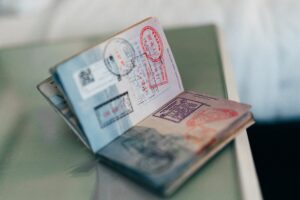Before applying for a non-immigrant visa, all applicants, including children, must pay a non-refundable, non-transferable MRV (Machine Readable Visa) fee, which is also known as the consular fee or application fee. Every visa application must include a consular processing fee. Only once the visa cost has been paid it is possible to schedule a consular interview at the US consulate. However, whether or not a visa is issued, the visa application fee must be paid. The cost amount is determined by the type of visa for which you apply. The fees connected with each non-immigrant visa type are listed in this article.
The US government charges different fees for non-immigrant and immigrant visas. Before applying for a visa, you should find out which US government agency charges a processing fee. Payment is made in the respective national currency, despite the fact that the visa fees are officially quoted in US dollars. As a result, visa fees fluctuate with the currency rate on a regular basis.
Types of Visa Fees for the USA
There are a variety of non-immigrant visas available in the United States, meaning there are various expenses associated with them. Non-petition-based visas and petition-based visas might be separated to get a clearer idea of how much these visa application fees are.
The following are the costs for a non-immigration visa:
Non-Petition Based Visa
Non-petition-based visas do not require an employer or a US resident to petition for a person who intends to enter the US for a limited period. The candidate can apply for a non-immigrant visa by filling out Form DS-160 and following the regular processes for paying a fee, scheduling an interview, submitting supporting papers, and sitting for the interview.
- US Visitor Authorization Visas (B-1 and B-2 Visa): $160
- C-1 visa for transits to the US: $160
- D visa for airline or ship crewmembers: $160
- F visa for students and academics: $160 (Read more)
- I visa for media and journalists: $160
- J visa for exchange visitors (excluding those applicants sponsored by the US government): $160
- M visa for vocational students: $160
- TN TD visa for NAFTA professionals: $160
- T visa for victims of human trafficking: $160
- U visa for victims of criminal activity: $160
Petition-Based Visas
Petition-based visas allow an employer or a citizen of the United States to appeal for a candidate who desires to live and find employment for a short time. Before the applicant may submit their Form DS-160, the employer should submit an appeal to the US Citizenship and Immigration Services (USCIS), the US Department of State, or the US Homeland Department.
- H visas for temporary workers (H-1B visa, H-1B1 visa, H-2A visa, H-2B visa, H-3 visa, H-4 visa): $190
- L visas for intracompany transfers (L-1 visa, L-2 visa): $190
- O visas for persons with extraordinary abilities (O-1 visa, O-2 visa, O-3 visa): $190
- P visa for athletes, entertainers, and artists: $190
- Q visa for international cultural exchanges: $190
- R visa for religious workers: $190
- E visa for traders and investors (E-1 visa, E-2 visa, E-3 visa): $205
- K visa for a fiancé or spouse of a US citizen: $265
Other Categories Visa
Other Categories and Fees should always be paid in addition to the petition and non-petition-based non-immigrant visas, such as:
- Issuance of Nonimmigrant Visas (Reciprocity Fees)
- Student and Exchange Visitor Information System (SEVIS)
- Blanket L Fee (Fraud Prevention and Detection Fee)
After their application is granted, applicants from certain countries may be asked to pay a visa issuance fee. These charges are founded on reciprocity fees (what another country charges a US citizen for a similar visa). When a foreign government imposes visa issuance fees on US citizens for specific categories of visas, the United States will charge reciprocity fees on nationals of that country for similar types of visas. From the time they receive their initial documentation (either an I-20 or a DS-2019) until they graduate/leave school or finish/leave a programme, the Student and Exchange Visitor Information System (SEVIS) is an online system that keeps track of F, M, and J visa holders (and their family members). Verify with the desired US institution to check if your information for F, M, and J visa primary applicants have already been entered into SEVIS. In addition to the visa application fee, a SEVIS charge must be paid. For nonimmigrant students with Form I-20, the SEVIS charge is US$350. For most exchange visitors who use Form DS-2019, the SEVIS fee is $220. Payments are not accepted at the Consulate or the Embassy. There is an exception to the SEVIS fee. Candidates registered in a government-sponsored programme (codes commencing with G-1, G-2, G-3, or G-7) are not required to pay the SEVIS fee. The payments listed apply to anyone applying for a Blanket L visa. On the day of the interview, fees must be paid at the consular section’s cashier window. First-time primary candidates who are affected by a blanket petition for L status must pay a $500 Fraud Prevention and Detection fee. If a future L-1 visa application is based on a new form, I-129S, the Fraud Prevention and Detection fee must be paid again. Read more.
- Fees for Biometric entering and exiting
- Blanket L Fees are Non-Refundable. L-2 Derivative Applicants are exempt from the higher fees.
For petitioners with any more than 50 US employees, with over half of those employees in H-1B or L status, a $4,500 fee is added to blanket L-1 applications.
Options of Payment Methods for Visa fees USA
The Visa Fee can be paid at US consulates worldwide through various options. The following payment options are available:
- Demand Draft (payable at par in favour of ‘US Embassy’)
- Indian Rupees or Dollars using a credit card (Master or Visa)
- Please note that personal cheques are not accepted
Cases When Fees are Not Necessary
You may not be required to pay a charge in the following circumstances:
- When applying for visas such as the A, G, C-2, C-3, NATO, and diplomatic
- In the case of a US government-sponsored J visa applicant
- When the original visa was poorly stamped, and it was not the applicant’s fault, a machine-readable visa must be replaced
- Applicants who are part of international agreements, such as UN Headquarters employees and their families
- Applicants who are travelling to raise funds for a good cause
- Travelling on official business for US government workers
- For the parents, siblings, spouse, and children of a US government employee murdered in the line of duty whose family is travelling to attend the funeral or burial
Conclusion
Thus, a consular processing fee is required with every visa application, and the amounts are usually determined by the type of visa you apply for. Even though visa fees are technically quoted in US dollars, payment is paid in the corresponding national currency. Non-immigrant visas are available in various forms in the US, which also means they come with various costs.
For more information, head on to LeapScholar.
Frequently Asked Questions
1. What is the Validity of the Counsellor Fee?
You will receive a payment receipt that is valid for one year after paying the visa fee. As a result, the visa fee is valid for a year from the date of payment. You should schedule an interview with a US consulate or embassy within this time, as the visa fee will be due again after the twelve-month period.
Note: The one-year expiration time has been prolonged until September 30, 2022, due to temporary worldwide consulate closures and the gradual return of restricted consular services due to the Covid-19 outbreak. It is necessary to investigate whether a Visa Fee Validity Extension has been implemented in your nation on a case-by-case basis.
2. Can US visa fees be paid on any date of the month?
The Reserve Bank of India (RBI) instructed all banks in India to remain closed on the second and fourth Saturdays of each month, effective September 1, 2015. As a result, US visa fee payment systems such as NEFT, payment at the bank, and mobile payment will not be operational on the second and fourth Saturdays of the month. Unless it is a bank holiday, all banks will work a full day on the first, third, and fifth Saturdays of the month, with operating hours identical to weekdays.
3. What if an Error occurs while paying US Visa Fees online?
Do not pay the fee a second time if you have encountered an error with your payment, as it will not be refunded. Please email support-india@ustraveldocs.com with your complaint, and we will look into it. Be warned that if you seek a chargeback that reverses a charge or payment, your case will be reviewed immediately, and you may face fines and/or other legal action as a result.







